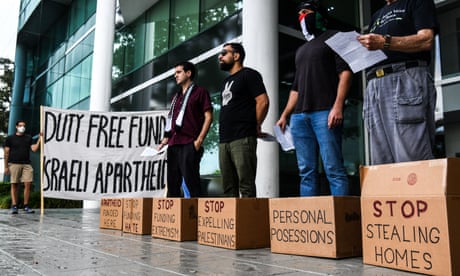- by foxnews
- 08 Apr 2025
ACLU asks supreme court to overturn Arkansas’ anti-boycott law against Israel
ACLU asks supreme court to overturn Arkansas’ anti-boycott law against Israel
- by theguardian
- 21 Oct 2022
- in news

The American Civil Liberties Union has asked the US supreme court to overturn an Arkansas law requiring companies to pledge not to boycott Israel in order to do business with the state.
The civil rights group's petition said that the law is in conflict with a supreme court ruling 40 years ago that popular boycotts have a long tradition in American history and are protected speech under the first amendment.
The ACLU's chief litigator in the case, Brian Hauss, said that if the law is allowed to stand it would not only intrude on the right to protest in support of the Palestinians but also legitimise parallel legislation in some states against certain kinds of boycotts over the climate crisis or in support of gun control.
"This tactic of state governments forcing contractors to disavow participation in particular boycotts is expanding beyond the Israel-Palestine issue now to address boycotts of firearms manufacturers or boycotts of the fossil fuel industry," said Hauss.
"If the supreme court doesn't weigh in, or if it says that states can do this, every state is going to have a raft of anti boycott-laws that are basically designed to protect whatever causes or interests are favored by the legislators in that state. Texas has already passed laws requiring contractors to disavow those kinds of boycotts and other states are implementing similar laws."
The ACLU is acting on behalf of the Arkansas Times newspaper and its editor, Alan Leveritt, after a federal appeals court upheld a 2017 Arkansas law requiring government contractors to pledge not to boycott Israel or face a loss of business. The state justified the move as "boycotting the boycotters".
Leveritt said he had no intention of boycotting Israel, with which the paper does no business, but he refused to sign the commitment because it "requires the Arkansas Times to take a political position in return for advertising".
As a result, the paper lost a contract with the state-run University of Arkansas.
Versions of the law have passed in more than 30 states in recent years, backed by both Republicans and Democrats, in a drive against the Boycott, Divestment and Sanctions (BDS) movement in support of the Palestinians. The legislation is supported by groups such as the American Jewish Committee which said it is intended to "combat the BDS movement, whose primary aim is to eliminate the state of Israel".
The state laws come alongside a push for national legislation in part to head off businesses cutting trade with illegal Israeli settlements in the occupied Palestinian territories, as the ice cream maker, Ben & Jerry's attempted to do before its parent company, Unilever, reversed the decision under pressure in Israel and the US.
But the legislation has faced repeated legal challenges and states have been forced to weaken its provisions.
Texas narrowed its law to exclude individuals, and apply only to larger companies, after a speech pathologist for a public school district sued when she lost her contract for refusing to sign a commitment not to boycott Israel. Earlier this year a federal judge blocked Texas from requiring that an engineering company sign an anti-boycott pledge but did not strike down the revised law.
The ACLU and other groups won judgements in Arizona, Georgia and Kansas that anti-boycott laws intruded on free speech rights.
But in June, a federal appeals court in St Louis upheld the Arkansas law. The ruling, written by Judge Jonathan Kobes, a Trump appointee who the American Bar Association said was "not qualified" for the post, said that the boycott law addressed economic activity not protected speech and so could stand.
Hauss said that decision flies in the face of a unanimous supreme court decision in 1982 protecting a National Association for the Advancement of Colored People-led boycott of white owned businesses in Port Gibson, Mississippi to protest against continuing racial segregation and inequality.
"The supreme court said in that case that the power of the states to regulate economic activity could not justify the suppression of a non-violent politically-motivated boycott to affect political, social and economic change. From our perspective, the supreme court was very clear that the first amendment does protect the acts of participating in a consumer boycott," he said.
Hauss also said that the laws were self-evidently aimed at shielding Israel, and only Israel, from legitimate protest.
"These are laws that specifically target boycotts of a single country and it's impossible not to draw the conclusion that they're designed to suppress the message expressed by these boycotts. So that raises another important first amendment principle, which is that the government is not supposed to suppress one side of a political debate. That's exactly what these laws are doing," he said.
Hauss said that if the supreme court overturns the Arkansas law then "all of these Israel anti-boycott laws will swiftly be declared unconstitutional".
But if the law is allowed to stand, the ACLU is not alone in fearing that it will pave the way for a raft of other anti-boycott legislation.
Laws to protect the gun industry from boycotts have passed in Texas and are pending in nine other states. Similar legislation to shield fossil fuel companies has passed in Texas, Kentucky, Oklahoma and West Virginia, and is pending in nine states.
- by foxnews
- descember 09, 2016
Ancient settlement reveals remains of 1,800-year-old dog, baffling experts: 'Preserved quite well'
Archaeologists have recently unearthed the remarkably well-preserved remains of a dog from ancient Rome, shedding light on the widespread practice of ritual sacrifice in antiquity.
read more


